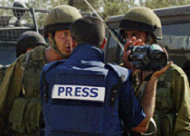
On the occasion of the United Nations Educational, Scientific and Cultural Organization’s annual commemoration of World Press Freedom Day on May 3, MIFTAH notes with dismay that impunity for attacks against journalists continues to prevail and urges authorities to find and punish those responsible.
In many ways the relative success of the February 8 ceasefire between Israel and the Palestinians has brought relief to the beleaguered media in the region. For the first time in five years there are no journalist killings tallied yet for this year. But daunting problems remain. Journalists in Palestine and Israel still face censorship, threats and intimidation, violence with impunity, and severe restrictions in the freedom of movement.
One of the most pressing problems is the impunity accompanying violence against journalists perpetrated by Israeli soldiers. According to statistics compiled by the International Press Institute, at least 497 out of a total of 562 press freedom violations carried out between September 29, 2000 and September 28, 2004, i.e. 88.4 percent of all abuses, were perpetrated by Israelis. The Israeli armed forces and other Israeli state authorities, including government and police, were responsible for 478 violations, i.e. for 85.1 percent of all violations of press freedom during the first four years of the second Intifada. This last group of violations is by far the most severe. It includes at least nine killings of journalists and scores of other attacks on media workers with lethal force by Israeli soldiers, in many cases ending with journalists sustaining injuries for life.
During the last four years, there were nine attacks on Palestinian media outlets, certainly targeted for destruction by the Israeli army. Another seven such attacks may have had the same purpose. Palestinian authorities did not target media outlets for destruction, although they did on several occasions shut some down by decree. Several individual Palestinian journalists have also been attacked by Palestinian militants during this uprising. Two have been killed. There was no punishment for any of the soldiers, individuals, groups, or authorities who initiated or carried out any of these crimes.
On April 14 of this year, Israel announced that it would not take disciplinary action against an officer thought responsible for the May 2003 killing of British freelance cameraman and film director James Miller in Gaza. Miller’s widow and international media freedom groups condemned the decision, as well as the fact that it took the army two years to complete its pseudo-investigation of the cold-blooded killing, enough time for the media to lose interest in the story.
On several recent occasions, journalists have been attacked by Israeli soldiers during demonstrations against the so-called ‘separation barrier’ or Annexation Wall that Israel is erecting in the Occupied Palestinian Territories. For instance, on April 22, in the West Bank village of Bal’in, west of Ramallah, soldiers reportedly attacked dozens of residents and activists who marched peacefully toward a construction site, while military bulldozers were uprooting the nearby village fields. The army fired rubber coated bullets and gas bombs as dozens of residents attempted to stop the bulldozers from uprooting the fields, and five residents were injured. One Israeli peace activist was arrested by the troops. Also, soldiers attacked several journalists, barred them from covering the events and attempted to confiscate their equipment.
Thus, militants as well as soldiers and other Israeli state agents have, at least implicitly, been encouraged to shoot journalists. In some cases they are even ordered to do so. But attacks on journalists are crimes; they are even crimes against humanity. Since humanity misses out on information about a conflict which may be crucial information; since journalists stick out conspicuously from combatants, with large and fluorescent PRESS or TV markings on jackets, helmets, cars, etc. in order not to be targeted; and since much of the reporting that is hindered by this violence are events involving even worse human rights violations, it is a particularly illegal (and cowardly) act to target journalists whose sole ‘offense’ consists of attempting to report the truth.
MIFTAH urges the international community to pressure the Israeli government and its occupying forces, as well as the Palestinian National Authority, to prosecute and punish those guilty of attacks on press freedom and to strictly abide by legally binding international law, which states that journalists and media workers must be respected and protected as stipulated under Articles 19 and 29 of the Universal Declaration of Human Rights, and Articles 50 and 51 of the “Protocols Additional to the 1949 Geneva Conventions,” which emphasize the protection of civilians, including journalists and media workers in times of war. Article 79 of the “Protocols Additional to the 1949 Geneva Convention” further states that “journalists engaged in dangerous professional missions in areas of armed conflict shall be considered as civilians within the meaning of Article 50, Paragraph 1. They shall be protected as such under the conventions of this Protocol, provided that they take no action adversely affecting their status as civilians.”







